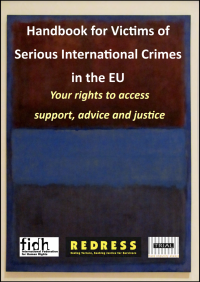Publications
REDRESS’ publications are also available in hard copy format. Please contact us for further information on [email protected].
Our annual report for 2015 provides an overview of the work that REDRESS undertook in over 25 countries affecting approximately 850 individual torture survivors from 1 April 2014 to 31 March 2015. The report shows that more and more of our clients are receiving positive judgments from human rights courts and related tribunals, but it also reminds us that impunity remains a deep-seated problem in many countries where we work and that we should continue to confront this problem, until we overcome it.
REDRESS, in collaboration with the Advocacy Forum, the Asian Human Rights Commission and the World Organization against Torture, made this submission to the UN General Assembly concerning the November 2015 Universal Periodic Review (UPR) of Nepal. Our submission addresses key areas of concern for human rights in Nepal, including continued impunity for serious human rights violations committed during the 1996-2006 internal armed conflict and since; serious flaws in the transitional justice law and transitional justice processes; Nepal’s failure to effectively respond to sexual violence; the continued practice of torture, and the ineffectiveness of the National Human Rights Commission.
This handbook for torture survivors contains useful information for victims, their families and friends, community members, and front-line service providers and advisers who work closely with survivors. In it, you can find information on how to access medical rehabilitation and care to address the physical, mental, and emotional well-being of torture survivors. It also details the steps to apply for asylum, how to regularise a torture victim’s immigration status, and where to look for advice on social welfare, employment, or education. It also includes information on torture victims’ right to justice, reparation and accountability, as well as a list of resources where survivors can seek further support.
Redress has submitted comments to the Registrar’s ReVision project as it relates to victims' rights before the International Criminal Court. This project is designed to re-organize and streamline the Registrar’s organizational structure and operations. Our comments focus on those aspects of the project that relate to the victims’ mandate of the Registry. We strongly urge the Registry to seek and take into account the views of victims and affected communities when determining how best to design victims’ function in the field. In order to do this the Registry should consider using planned field missions over the coming months to gather additional information from victims and intermediaries.
REDRESS in collaboration with partner organisations, has urged Latvia - the current holder of the EU Presidency - to prioritise the fight against impunity for serious international crimes at the upcoming Justice and Home Affairs (JHA) Council meeting, in order to raise awareness of the challenges faced by national criminal justice authorities of the EU in investigating, prosecuting and punishing serious international crimes. Other organisations supporting the letter are the Fédération Internationale des ligues des droits de L'Homme (FIDH), the European Center for Constitutional and Human Rights (ECCHR), Amnesty International (AI), Track Impunity Always (TRIAL), Human Rights Watch (HRW), the Coalition for the International Criminal Court (CICC) and RCN Justice & Démocratie.
The Victims' Rights Working Group, a coalition of experts and civil society organisations informally facilitated by REDRESS, made a series of recommendations to the Assembly of States Parties that meet in New York from 8 to 17 of December 2014. Some of the recommendations to ICC Member States included: that it consults broadly during the 2015 review process of the Victims' Strategy; that it also reviews with broad consultation the Guidelines on Intermediaries and that it ensures that sufficient resources are allocated for its dissemination; and that it continues to engage in discussions with victims' legal representatives and civil society experts on how to improve the current system for victims' participation and legal representation. The VRWG also made some recommendations to the Court, including that any review of the Court's practices on victims-related issues tries to ensure reparative, effective and meaningful procedures, not merely less costly ones, and that the adopted Guidelines on Intermediaries are made available in different languages.
In this letter, REDRESS and other NGOs urge the UK Prime Minister to establish an inquiry into UK involvement in rendition and torture, with the powers and independence it needs to get to the truth, and a mechanism to allow the meaningful participation of victims. The other NGOs are the AIRE Centre, Amnesty International UK, Cage, Freedom from Torture, JUSTICE, Liberty, Reprieve and Rights Watch UK.
REDRESS has published a new handbook to help victims of serious international crimes and their families access support and justice in the European Union with partners FIDH and TRIAL. It aims to serve as a guide for victims of serious international crimes (genocide, crimes against humanity, war crimes, torture and enforced disappearance) who are interested in filing a formal complaint within the EU as well as victims who are already seeking justice through EU courts. It may also be useful for victims that are seeking asylum as well as individuals living in another country outside the EU, but have information or evidence which suggests that persons or organisations responsible for what happened are inside the EU.

